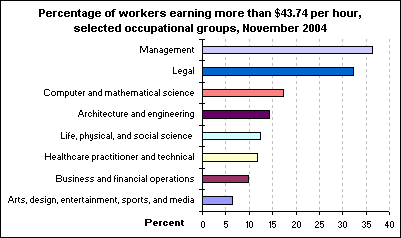Best Paying Jobs in Consumer Services
Today’s fastest-growing industries are customer service and consumer services. These prospects can apply to nearly any field. Consumers value these products and services. There are hundreds of thousands of job openings in these fields. This article will cover the top paying consumer services jobs, as well as the highest-paying positions in each field. Read on to learn about the top consumer services jobs for 2019 and how you can get one of these lucrative careers.
Human Resources Specialists
According to the Bureau of Labor Statistics (BLS), human resources specialists earn a median salary of $60,350 per year. However, there are two distinct types of human resources specialists. These individuals specialize in compensation planning, benefits, and position classification. Compensation specialists may help companies evaluate their current pay structures and benefits program or create new job descriptions. These professionals tend to earn the highest salaries in the consumer services industry, though they can earn much more.
In addition to their role in the compensation system, Human Resources Specialists conduct research on compensation surveys and analyze job titles to determine salaries. They also oversee benefits plans and employee surveys. They are expected to enjoy a ten percent job growth over the next ten years, faster than the average for all occupations. Between 2010 and 2024, 73,400 new openings are expected, many of which will come from a need to replace existing workers.
Many HR specialist careers are in employment services. These professionals are responsible for hiring, assessing, and training employees. The employment services industry is expected to grow 7% over the next decade, partly because of an aging workforce and other factors. In addition to providing employment services, these professionals assess job applicants and evaluate them for the appropriate skills and abilities. They also develop training programs and develop policies to improve the quality of the workforce and society.
Financial Analysts
If you love financial planning and are interested in making financial decisions, a career as a financial analyst could be right for you. A career as a financial analyst involves evaluating facts and comparing them. As a result, you will likely have to use graphs and charts to assess the merits of different choices. But this is just the beginning of a successful career as a financial analyst. You will need to get a degree in finance and some on-the-job experience to make it in this field.
While entry-level positions often require a bachelor’s degree, more advanced roles often require a master’s degree in business administration or finance. Advanced positions may require specific knowledge of options pricing, bond valuation, risk management, and other financial topics. Financial analysts are also required to have a license from the Financial Industry Regulatory Authority, or FINRA. Many employers prefer candidates who are FINRA-licensed.
As a financial analyst, you’ll analyze company finances and perform mathematical calculations to determine which stocks to buy or sell. For entry-level jobs, you’ll need a bachelor’s degree in business administration, economics, or finance, and at least five years of related work experience. As a senior financial analyst, you’ll earn an average of $45,000 per year, with the possibility to rise as high as $75K.
Medical receptionist
A Medical Receptionist is one of the best paying consumer service jobs. They are responsible for greeting patients, answering phones and doing data entry. They also handle billing and bookkeeping duties. These jobs are closely related to those in the finance industry. A Medical Receptionist makes an average annual wage of $38,580. They also perform other clerical tasks such as data entry. Some Medical Receptionists work in financial institutions or hospitals.
This career path requires excellent customer service and strong interpersonal skills. This role involves working under pressure and is also highly organized and detail-oriented. It also requires a working knowledge of basic medical procedures and terminology. However, there are many opportunities for growth in this field. Receptionists can advance to be medical office managers or insurance billing specialists. Some also opt to go into the medical coding field.
The duties of a Medical Receptionist include communicating with patients, doctors and medical staff. They must listen carefully and respond in a way that is understandable to everyone. They should be patient-oriented and be able to prioritize tasks. They must be organized and have good memory and filing skills. They should be able to keep patient records, insurance cards and other information organized. The salary is above average for this position.

